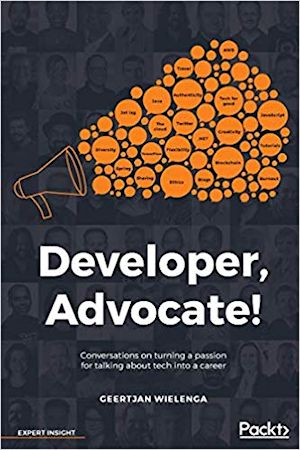
Developer, Advocate!
Conversations on turning a passion for talking about tech into a career
By Geertjan Wielenga
Copyright 2019
Published by Packt Publishing Ltd.
I met Geertjan seven years ago when he contacted me on LinkedIn. He’d come across my profile and saw that I was a college teacher and he wanted to ask if I’d like to write a paper with him about Java in education. I was flattered, said yes, and didn’t get back to him for seven months. By then I had started a blog and thought he’d find what I wrote of interest to the Java community. He responded by inviting me to be on a panel at Java One. It became clear to me then that he was, and remains to this day, not just an Oracle advocate but also an advocate’s advocate. This by itself makes this book a must read.
In this book Geertjan has conversations with 32 individuals who share, either full time or part time, the role of a tech advocate. The first thing that makes this book a pleasure to read is that the format is conversational. These are not interviews for the Wall Street Journal. It feels more like two friends sitting on a sofa discussing a topic that interests the both of them.
Geertjan’s questioning style changes from advocate to advocate. He recognizes that each of the people he is speaking with has their own style and he structures his questions appropriately. Still, he does bring up similar topics. One of my favourites is asking about how subject of a chapter has responded to technical failures during presentations. In some respects I am reminded of Proust’s Questionnaire. The similarity of the questions allows us to learn that being a developer advocate can mean different things to different people.
This book shows us that the successful advocates, and we know they are successful because Geertjan included them in his book, recognize that they are not salespeople. Those that work for companies with the title advocate recognize that their success when presenting is tied to their honesty. Yes, the company they work for sells a great product or service, but nothing is perfect and competitors are not enemies. It was refreshing to read this.
Then there are advocates who do not represent a particular product. Some are consultants and some are academics but regardless of their background or how they pay the bills they all say that the most rewarding part of what they do is to inspire developers to do great things.
One line of inquiry in the book is to ask what the future may hold. The advocates are uniquely placed to comment on the future because they do not work in a bubble. They visit the front lines of developers. They enjoy the opportunity to talk with anyone who has come to listen to them. They have a much larger view of software development than you and I likely do.
I am going to reveal something a book reviewer should probably never do. I haven’t finished reading the book. I don’t want to finish it. I want to pick it up during quiet moments and be inspired by the stories Geertjan tells in his conversations. I have met more than half the advocates in this book at conferences. What this book is giving to me are insights into what the role of the advocate is in our industry and the career of developer advocate. It should never end.

Awesome! well written, Ken! … I also highly recommend this book!
Pingback: Java Annotated Monthly – December 2019 | IntelliJ IDEA Blog